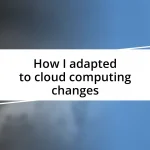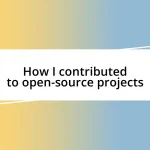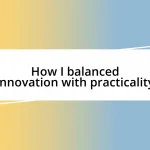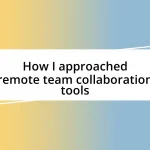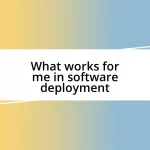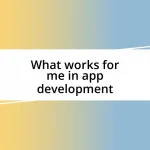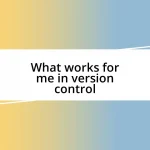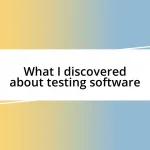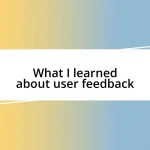Key takeaways:
- Discovering open-source software sparked a passion for customization, collaboration, and community engagement, leading to a deeper connection with technology.
- The experience of contributing to projects, facing challenges, and receiving constructive feedback fostered personal growth and enhanced skills within a supportive environment.
- Valuable lessons learned include the importance of community support, patience, perseverance, and embracing diverse perspectives in the open-source ecosystem.

What is open-source software
Open-source software is essentially software whose source code is made available to the public, allowing anyone to see, modify, and distribute it. I still remember the moment I discovered this world. It felt like unlocking a door to a treasure chest; suddenly, I had the power to customize and tweak the software to my heart’s content, something that wasn’t possible with proprietary options. Isn’t it exhilarating to think that you can participate in the development process of tools you use every day?
What struck me most about open-source software was the community behind it. There’s this sense of collaboration and shared mission that’s incredibly compelling. I recall joining an online forum where we brainstormed solutions for a bug in an application I was using. Seeing people from all corners of the globe unite for a common goal was not just inspiring; it was empowering. It made me feel part of something larger than myself—have you ever felt that rush of connection while engaged in a collaborative effort?
Furthermore, open-source software fosters innovation. Each contribution is an opportunity to build upon others’ work, creating a version that is often more robust and versatile than any single company’s efforts. I can’t help but marvel at how many tools I now rely on were born from this collaborative spirit. It raises an important question: how much richer could our technological landscape be if more projects embraced this approach? The potential is limitless.

Benefits of using open-source software
One of the standout advantages of open-source software is its cost-effectiveness. When I first explored various tools, I was astounded to find high-quality options available for free. It was a delightful surprise to access advanced functionalities without the usual price tag associated with proprietary software. This opened up a world where small businesses and independent developers can innovate without breaking the bank.
- No licensing fees: Open-source software often comes without the monetary burden that proprietary software carries.
- Greater accessibility: Anyone with the desire can access and use powerful software solutions, leveling the playing field.
- Community support: With many enthusiastic users, you can often find help or troubleshooting advice readily available online.
Additionally, the transparency inherent in open-source software builds trust within the community. I remember a time when I had concerns about security in a popular application, and it was comforting to know I could examine the code myself, or refer to discussions among knowledgeable peers. This openness not only provides reassurance but also encourages improvement and swift updates; when vulnerabilities are discovered, they can be patched rapidly, often by the very users who depend on the software.
- Evolving security: The community can address security flaws much faster than traditional software companies.
- Insight into the code: Users gain insights into how the software operates, which fosters a deeper understanding and confidence in its use.
- Collaborative improvement: Many voices contribute to enhancements, leading to a more robust final product than solo efforts could achieve.
Embracing open-source software has truly transformed my perspective on technology, instilling a sense of community and empowerment that I genuinely cherish.

My early experiences with open-source
When I first dipped my toes into the world of open-source software, I felt like a kid in a candy store. I vividly recall downloading my first open-source program, and the thrill of seeing the code was incredible. It was a little like peeling back the layers of a mystery; I realized that I could not only use the software but also dive deep into how it worked, which sparked my curiosity.
As I engaged with various open-source projects, I remember feeling both intimidated and excited. Joining a collaborative project to contribute my first piece of code was daunting. Imagine hitting “submit” on something that would be scrutinized by experienced developers! That moment of vulnerability transformed into exhilaration when I received constructive feedback. It opened my eyes to the powerful learning experience that comes from collaboration and community input.
Looking back, I can’t help but appreciate how the open-source community offered me a safe space to explore, learn, and grow. I often think of a specific instance where I struggled with a coding issue. After posting in a forum, I was surprised when a seasoned developer took the time to help me troubleshoot. That moment underscored the importance of giving and receiving support within this community, reinforcing my belief that we’re all better together.
| My Experience | Community Interaction |
|---|---|
| Downloading my first open-source program felt exhilarating. | Joining projects introduced me to supportive and collaborative peers. |
| Contributing code was a mix of intimidation and excitement. | Constructive feedback from others transformed my learning experience. |
| Feeling supported during challenges reinforced my commitment. | A seasoned developer’s help highlighted the community spirit. |

Popular open-source projects I explored
Exploring popular open-source projects has been a transformative part of my journey in tech. One project that truly caught my attention was WordPress. I remember the first time I built a site using it; I was amazed by how customizable everything was! I experimented with different themes and plugins, which made me feel like an artist and a developer at the same time. Can you imagine creating a site from scratch without any prior design experience? That’s what open-source software allowed me to do.
Another project that left a mark on me was GIMP. Initially, I approached it with skepticism, thinking it wouldn’t stand up to the likes of Photoshop. But as I dove into the editing tools, I was pleasantly surprised. The community around GIMP is incredible; I recall finding a detailed tutorial that guided me through the intricacies of the software. It made me realize that not only could I edit photos professionally, but I could also share my creations online with confidence. Have you ever experienced that blend of joy and newfound skill? It’s an experience I cherish.
Lastly, my exploration of Linux was a game-changer. Transitioning from Windows to various Linux distributions felt like stepping into a new universe. I vividly remember setting up my first development environment on Ubuntu. The thrill of accessing powerful terminal commands and customizing my operating system was unmatched. It felt empowering to take control of my machine, shaping it to suit my needs. What about you? Have you ever had that moment where you felt in charge of your technology? For me, it was liberating!

Challenges faced in open-source
Engaging with open-source software isn’t always a smooth ride; I often faced challenges that tested my resolve. One significant hurdle was the steep learning curve that many projects present. There were moments when I felt overwhelmed by the extensive documentation and varied coding styles. Have you ever found yourself staring at a set of instructions, lost in a sea of technical jargon? I definitely have! It sometimes felt like trying to decode an ancient language, and it took time to navigate it successfully.
Another challenge I encountered was the inconsistency in project quality. While many open-source projects are incredibly robust, others can be rough around the edges. I remember downloading a library to speed up my application, only to find it lacked adequate support and documentation. That left me frustrated. It made me realize how important it is to research and choose projects wisely before diving in.
Additionally, contributing to these projects could be quite daunting, especially regarding code reviews. I recall one instance where my contributions were met with extensive critique, which felt a bit disheartening at first. However, it turned into a pivotal moment for growth. The feedback illuminated areas I hadn’t considered, pushing me to refine my skills. How do you react to constructive criticism? I found that embracing it not only strengthened my code but also deepened my appreciation for the diverse expertise within the community.

How I contributed to open-source
Contributing to open-source was an eye-opening experience for me. One of my first contributions was to a small documentation project. I recall spending hours refining a section that outlined installation steps. When I submitted my edits and received positive feedback, it sparked a thrill in me. Have you ever felt that rush of accomplishment from helping others navigate a complex process? It was that moment I realized how impactful documentation can be in open-source communities.
As I grew more comfortable, I began tackling coding challenges. I vividly remember my first pull request to a popular JavaScript library. The excitement mixed with anxiety as I hit “submit” was palpable. What if my code was rejected due to silly mistakes? But instead, I received constructive feedback that guided me through the review process. The collaborative spirit of the community was refreshing. I felt a genuine sense of belonging, knowing that even experienced developers welcomed fresh perspectives.
Over time, I found myself mentoring new contributors. Guiding them through their first issues reminded me of my early days, and I cherished every moment. I vividly recall a conversation with a newcomer who expressed doubts about their coding skills. I reassured them by sharing my own struggles. Have you ever found joy in lifting someone else’s spirits? It reinforced my belief that open-source is not just about the code; it’s about fostering a supportive environment where everyone can learn and grow together.

Lessons learned from open-source involvement
One of the most valuable lessons I learned through my open-source involvement was the importance of community. I still remember my first contributors’ meeting, where I was initially intimidated by the experienced developers discussing their projects. However, once I shared my thoughts, I was met with encouragement and enthusiasm. It made me realize how vital it is to foster a nurturing environment—have you experienced that supportive camaraderie? Working together can amplify our strengths and build something amazing.
Another insight was the necessity of patience and perseverance. I recall feeling disheartened after a particularly complex bug fix took me days to resolve. That frustration turned into determination when I finally identified the issue. Celebrating those small victories taught me that patience leads to growth in both skills and confidence. Have you noticed how persistence can transform frustration into accomplishment? I found it to be an enriching experience that’s essential in the ever-evolving world of open-source.
Additionally, I learned to embrace the beautiful diversity of thought and expertise within the open-source community. During one project, our team included contributors from different countries, each bringing unique perspectives to the table. I valued those discussions that sometimes challenged my assumptions. It made me appreciate that varied viewpoints not only enhance the code but also enrich the collaborative process. How often do we open ourselves to new ideas? For me, it was a transformative experience that broadened my understanding of both technology and teamwork.
